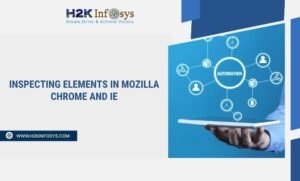In light of the current software industry’s progressive embrace of automation testing, testers are eager to identify the finest technology for streamlining their work processes. Selenium comes to mind when we discuss dependability, simplicity, and adaptability. Due to the multiple advantages, Selenium provides testers, it is one of the greatest automated testing solutions available. Selenium also supports a number of programming languages, lest we forget.
As a Selenium tester, it’s essential to understand that mastering one or more programming languages is crucial for effective automation testing. Selenium WebDriver supports languages like Java, Python, C#, and JavaScript, allowing testers to choose one that aligns with their projects and skill set.
Learning a programming language enables you to fully utilize Selenium’s functionality, empowering you to write scripts that are robust, scalable, and easy to maintain. For example, Java is popular for its compatibility with TestNG and JUnit frameworks, while Python is valued for its readability and streamlined syntax, making it ideal for creating concise scripts.
To strengthen these skills, enrolling in Selenium online courses can be incredibly beneficial. These courses provide structured training on the programming languages commonly used in Selenium, helping you gain practical experience and build confidence in automation testing. By mastering programming for Selenium, you’ll be equipped to tackle complex scenarios, handle data-driven tests, and create efficient testing frameworks that enhance your value as a Selenium tester.
You cannot, however, be an expert in all of them, therefore you must choose the finest for the project. You can learn the foundation of these programming languages by enrolling in the online Selenium training programs available. Here are some of the programming languages to learn as a Selenium tester.

1.Java.
Large organisations around the world strongly like Java, which was developed by Oracle Corporation and has been around for many years. Many people are comfortable using Java programming to automate tests. Most businesses now use Java as their primary programming language because of its dependability. Additionally, becoming proficient in Java might help you find numerous work prospects in the field of automation testing.
In every country, Selenium testers prefer Java. The fact that a sizable global user base exists for the language is one of these considerations. As you are aware, Java has been available for some time, and both novices and experts can use its extensive resource library and frameworks for a variety of applications. This makes Java one of the best programming languages to learn for selenium testing.
You don’t need to worry about the advanced level while learning Java for Selenium because it simply needs a rudimentary understanding. This will enable you to start testing while you simultaneously learn.
However, in order to include Java’s coding syntax in the test scripts, you must invest the time and effort necessary to learn it. It includes a large number of open-source libraries and a built-in stack allocation method.
Selenium WebDriver and Java Unit work well together to enhance the capability of automated browser testing for websites and web applications. Java is one of the most important languages to learn if you want to run effective test scripts because it was used to construct numerous open-source frameworks.
2.Python.
According to the 2019 Stack Overflow Developer Survey, 73.1% of respondents chose Python as their preferred programming language. Thus, it emphasises the enormous longevity of popularity.
Another useful language to learn for the Selenium testing tools is Python. It primarily uses a streamlined syntax that translates the language to English for simple comprehension. On the other hand, the streamlined syntax also facilitates your learning process.
To execute a test script effectively, it’s essential to understand where and how to implement it within the testing framework. This knowledge allows you to create organized, modular scripts that integrate smoothly into automation processes, enhancing test accuracy and reliability.
For beginners, choosing a language with simple syntax is key. Python is a popular choice due to its readability, allowing new testers to focus on testing concepts without complex code. JavaScript is also great, especially for frontend testing, thanks to its compatibility with web workflows.
Starting with an easy-to-learn language helps you build confidence in script creation and execution, paving the way for advanced automation skills.
Python offers a large number of resources and an open library, which is another argument in favour of using it for Selenium. Python is available for free if you enjoy free things. It also enables developers to complete tasks correctly without having to write new code for each one.
3.C#.
Microsoft’s C# is a well-liked programming language that is frequently chosen for the test automation process. OOP is among the C# ideas (Object Oriented Programming). This programming language, which makes use of the.NET framework, processes test scripts for automated testing relatively quickly.
C# is a powerful choice for automated testing, allowing efficient testing of applications on Windows, iOS, and Android. Its compatibility with Selenium and integration with Visual Studio make it easy to create and maintain reliable test scripts. With its strong type-checking, extensive library support, and ability to handle complex test scenarios, C# enables scalable, high-quality automation.
This makes it an ideal choice for testers aiming for cross-platform consistency and efficiency, particularly when testing applications across Windows, iOS, and Android. C#’s structured, object-oriented nature ensures that test scripts are not only reliable but also easier to maintain and adapt as projects grow, offering testers a powerful tool for achieving robust, seamless automation across varied environments.
To facilitate and ease the automated testing process, C# also includes the ability to integrate with Selenium WebDriver. This language offers a few user-friendly characteristics that make it successful in the field of automation testing. As a result, make time in your calendar to learn C# if you intend to learn additional programming languages for creating test cases.
4.Ruby.
Many Selenium testers find Ruby to be an excellent language for automation, often preferring it over other options due to its simple, readable syntax and flexibility. Ruby’s straightforward code structure allows testers to write clean, concise test scripts quickly, which is particularly useful for teams aiming to keep their test suites easy to understand and maintain.
Additionally, Ruby has a supportive community and extensive libraries, including Watir (Web Application Testing in Ruby), which complements Selenium and enhances automation capabilities. With its focus on simplicity and developer-friendly syntax, Ruby enables Selenium testers to focus more on creating effective test cases and less on handling complex code, making it a popular choice for those who value efficiency and clarity in their test automation projects.
Ruby’s compatibility with many security frameworks is one of its best features. When working with Ruby, data and test scripts are extremely secure and cannot be taken over. Ruby will win you over if you’re a tester who enjoys writing programs because it’s simple and enjoyable to do so.
Finally, you can freely and anytime access the many resources that are offered. And one language that makes it possible to finish the testing process rapidly is Ruby. If you wish to take advantage of these benefits, think about using Ruby for your Selenium tool.

Conclusion
These are the top programming languages for automation testing that are becoming increasingly popular right now. To advance their knowledge in the field of automation testing, developers and automation testing firms are prepared to devote their time, money, and effort in learning to code in various programming languages.
As a Selenium tester, being familiar with programming languages like Java, Python, C#, or JavaScript can greatly simplify the process of writing test cases or scripts. Selenium WebDriver supports multiple languages, allowing testers to choose one that aligns with their skills or project requirements.
For instance, Java is popular in the Selenium community due to its extensive libraries and compatibility with frameworks like TestNG or JUnit, which enhance test management and reporting. Python, known for its readability, also integrates well with Selenium, making it easier to write concise and manageable test scripts.
Familiarity with any of these languages not only helps in creating robust test cases but also enhances debugging and customization capabilities. Knowing JavaScript can be particularly beneficial for testers working on frontend-heavy projects, while C# works seamlessly within .
NET environments. With programming knowledge, Selenium testers can handle complex test scenarios, manage data-driven tests, and create more efficient, maintainable automation frameworks.Applying for a Selenium online certification course will allow you to investigate your options.
Call to Action
Unlock your potential as a Selenium tester by mastering the right programming language with H2K Infosys! Whether you’re leaning towards Java, Python, C#, or JavaScript, our expert-led courses are designed to equip you with the essential skills and hands-on experience needed to excel in automated testing.
Through comprehensive lessons and real-world projects, you’ll learn how to write efficient, robust scripts, troubleshoot effectively, and master the nuances of each language within testing frameworks. Elevate your career in QA by building a strong foundation in automation and positioning yourself as a sought-after expert in the field.
Join H2K Infosys today and gain the knowledge to become a versatile Selenium tester in a competitive tech world. Enroll now and take the first step toward mastering Selenium with the language that suits you best!

























